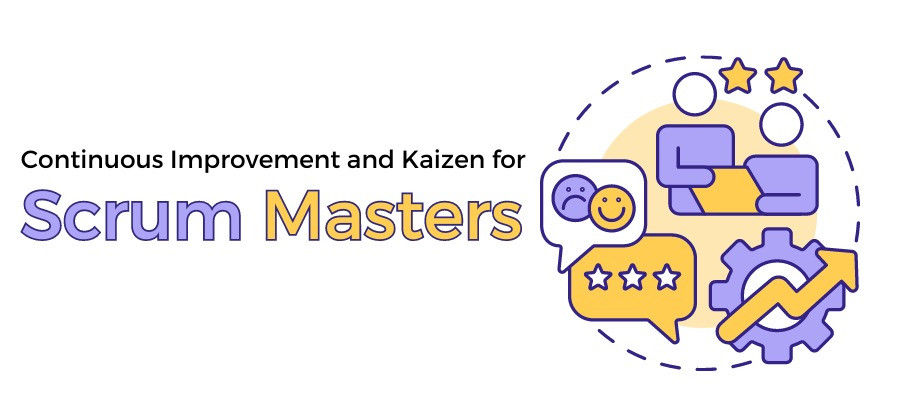Continuous Improvement and Kaizen for Scrum Masters

Today the role of a Scrum Master has emerged as a crucial facilitator in Agile Software Development projects. Hence, Continuous Improvement and embracing the Kaizen approach becomes paramount. Scrum Masters are responsible for fostering a culture of continuous improvement and driving the success of the Scrum Team.
What is Kaizen, and what is its role in Continuous Improvement? Both are closely related concepts that go hand in hand in Agile. In simple terms, Continuous Improvement is a fundamental Agile principle, while Kaizen is a specific approach to achieving Continuous Improvement.
This article explores the significance of Continuous Improvement and Kaizen for Scrum Masters, highlighting essential practices and techniques that can enhance their effectiveness.
The Agile Mindset and Continuous Improvement:
At the core of Agile methodologies lies the Agile mindset, which emphasizes adaptability, collaboration, and continuous improvement. Scrum Masters, as Agile leaders, must embody this mindset and foster a culture of continuous improvement within their teams. By promoting a learning environment, Scrum Masters can encourage individuals to reflect on their work, identify growth areas, and seek improvement opportunities.
The Role of Scrum Masters in Continuous Improvement:
Scrum Masters act as catalysts for continuous improvement by facilitating various Agile ceremonies and promoting collaboration among team members. Let's explore how Scrum Masters can leverage different Scrum practices to drive continuous improvement:
Sprint Retrospective:
The Sprint Retrospective is a dedicated time for the Scrum Team to reflect on the previous sprint and identify strengths, areas for improvement, and actionable steps for enhancing their performance. Scrum Masters should guide the retrospective sessions, ensuring all team members actively participate and share their insights.
Daily Scrum:
The Daily Scrum is a short, time-boxed meeting where the Scrum Team synchronizes their activities, discusses progress, and identifies any impediments. Scrum Masters can encourage open communication during this meeting, promoting collaboration and addressing any challenges hindering progress.
Sprint Review:
The Sprint Review allows the Scrum Team to showcase the work completed during the sprint to stakeholders and gather feedback. Scrum Masters can facilitate the review process, encouraging constructive dialogue between the team and stakeholders to uncover areas for improvement.
Why Scrum Masters Must Use Kizen for Continuous Improvement?
Continuous improvement in Agile emphasizes the ongoing process of enhancing best practices, procedures, and outcomes. It involves regularly assessing current approaches to make improvements in achieving better results.
As a specific methodology, Kaizen is rooted in the Japanese management approach. It focuses on making smaller yet incremental improvements while involving every individual in the organization. Kaizen encourages a culture of ongoing improvement. The Scrum Master can use Kaizen to identify problems and implement changes. He can enhance the productivity of the Scrum Team and optimize processes through smaller and sustainable improvements.
So, while Continuous Improvement is a broader concept for achieving better outcomes, Kaizen provides a specific methodology that supports the practice of Continuous Improvement in an Agile context.
Kaizen Principles for Scrum Masters:
Kaizen, a Japanese term meaning "change for the better," emphasizes continuous improvement in all aspects of work. Scrum Masters can adopt Kaizen principles to enhance their effectiveness:
Know Your Customer:
Understand and connect with your customers' needs for enhanced value. Eliminate waste and continuously refine processes, resources, and materials. Lead effectively at the production site where value is created. Set clear goals, provide necessary tools, and empower the team. Ensure visibility and verifiable data for continuous improvement and success measurement.
Encourage Small Iterative Improvements:
Scrum Masters should encourage the Scrum Team to make small, incremental improvements in their processes and practices. The team can continuously evolve and adapt without disrupting their workflow by focusing on small changes.
Foster a Culture of Experimentation:
Scrum Masters should create an environment where the team feels empowered to experiment with new ideas and approaches. Encouraging a mindset of learning from failure promotes innovation and growth within the Scrum Team.
Facilitate Knowledge Sharing:
Scrum Masters play a vital role in promoting knowledge sharing among team members. They can organize workshops, coaching sessions, or Agile training to enhance the skills and capabilities of the Scrum Team, enabling them to deliver higher-quality outcomes.
How Can Scrum Masters Succeed with Kaizen?
Scrum Masters can leverage Kaizen principles by using the following tips:
- Know Your Customer: Understand customer needs for better project outcomes.
- Continuous Improvement: Improve iteratively rather than in larger leaps.
- Combine Kaizen with Scrum and Agile: Enhance team management and adhere to best practices.
- Provide Mentorship: Act as a mentor to empower teams and foster self-improvement.
- Establish Communication: Foster transparency and information flow for better evaluation.
- Track Progress: Maintain transparent impediment logs and brainstorm with the team.
- Achieve Efficiency: Incorporating Kaizen improves overall team efficiency and goal attainment.
This industry-approved axiom enables an Agile Leader to create a better project environment and achieve the Product Vision more efficiently.
Key Takeaways:
Continuous improvement and adopting Kaizen principles are essential for Scrum Masters to excel in their role and drive successful Agile Transformation. Remember, as a Scrum Master, you can be an Agile Leader, a Facilitator, and an Agile Coach. Embrace Continuous Improvement and Kaizen to guide your team towards success in their Agile journey. Foster the Agile mindset to build a culture of Continuous Improvement. Empower the Scrum Team to deliver value consistently through small iterative improvements and a commitment to Learning. Finally, lead the Agile Teams toward higher productivity and improved collaboration!
References
- https://www.linkedin.com/pulse/scrum-masters-guide-kaizen-how-can-succeed-michael-parascandola/



